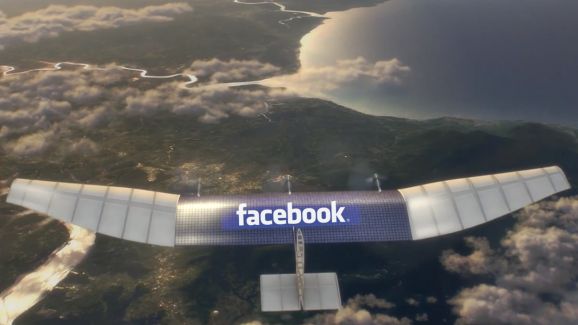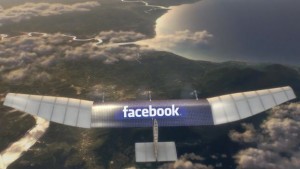
Solar powered Facebook drones to beam down internet for remote areas!
There would soon be huge solar-powered drones as large as the wingspan of a commercial airliner greater than 29 meters but weights lot less – beaming down internet in the remotest of areas and provide connections to rural and internet-free zones.
Facebook has been testing such drones in the skies over England, according to its CEO Mark Zuckerberg. The drones use lasers to beam internet access down to the ground, designed to provide connections to rural and internet-free zone.
“As the world becomes more complex and governments everywhere struggle, trust in the internet is more important today than ever. The internet is our shared space. It helps us connect. It spreads opportunity. It enables us to learn. It gives us a voice. It makes us stronger and safer together. To keep the internet strong, we need to keep it secure. That’s why at Facebook we spend a lot of our energy making our services and the whole internet safer and more secure. We encrypt communications, we use secure protocols for traffic, we encourage people to use multiple factors for authentication and we go out of our way to help fix issues we find in other people’s services.” ‘As part of our Internet.org effort to connect the world, we’ve designed unmanned aircraft that can beam internet access down to people from the sky,’ Zuckerberg said in his blog post. ‘We’ve successfully completed our first test flight of these aircraft in Britain,’ he wrote.
Developed by Ascenta, a Somerset-based designer of solar-powered drones bought by Facebook in March 2014, will be able to fly at altitudes of 60,000 feet for months at a time on solar power. ‘Aircraft like these will help connect the whole world because they can affordably serve the 10 percent of the world’s population that live in remote communities without existing internet infrastructure,’ Zuckerberg said.
The drones form part of Facebook’s internet.org initiative that aims to connect the next billion people to the internet, creating new markets for the social network which already connects 1.39 billion monthly active users.
Google is also planning to provide internet access to non-connected areas using both high altitude balloons and drones, buying American drone firm Titan Aerospace in April last year.
If these experiments are successful Internet can be provided to the remote places in the world including Africa, India, Brazil.
Facebook-backed Internet.org is extending its offer of free but limited Internet access to India via a mobile app.
The launch of the app in India follows similar introductions in Ghana, Zambia, Colombia, Kenya and Tanzania, despite criticism from activists that the program does not meet its stated objective of providing free and unfettered Internet access to all.
The common thread in all these launches is that the app is available only to subscribers of one operator in the country. In India, for example, Internet.org has tied with Reliance Communications, the country’s fourth-largest mobile services provider.
Internet.org is a collaborative effort, launched in 2013 by Facebook and other tech companies including Ericsson and Samsung Electronics, that aims to provide Internet access to those who don’t yet have it.
“Connectivity can’t just be a privilege for some of the rich and powerful,” Facebook CEO Mark Zuckerberg said last year at the first meeting of Internet.org. “It needs to be something that everyone shares, and an opportunity for everyone.”

